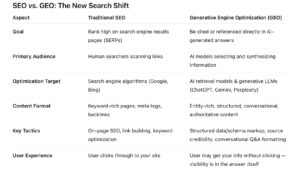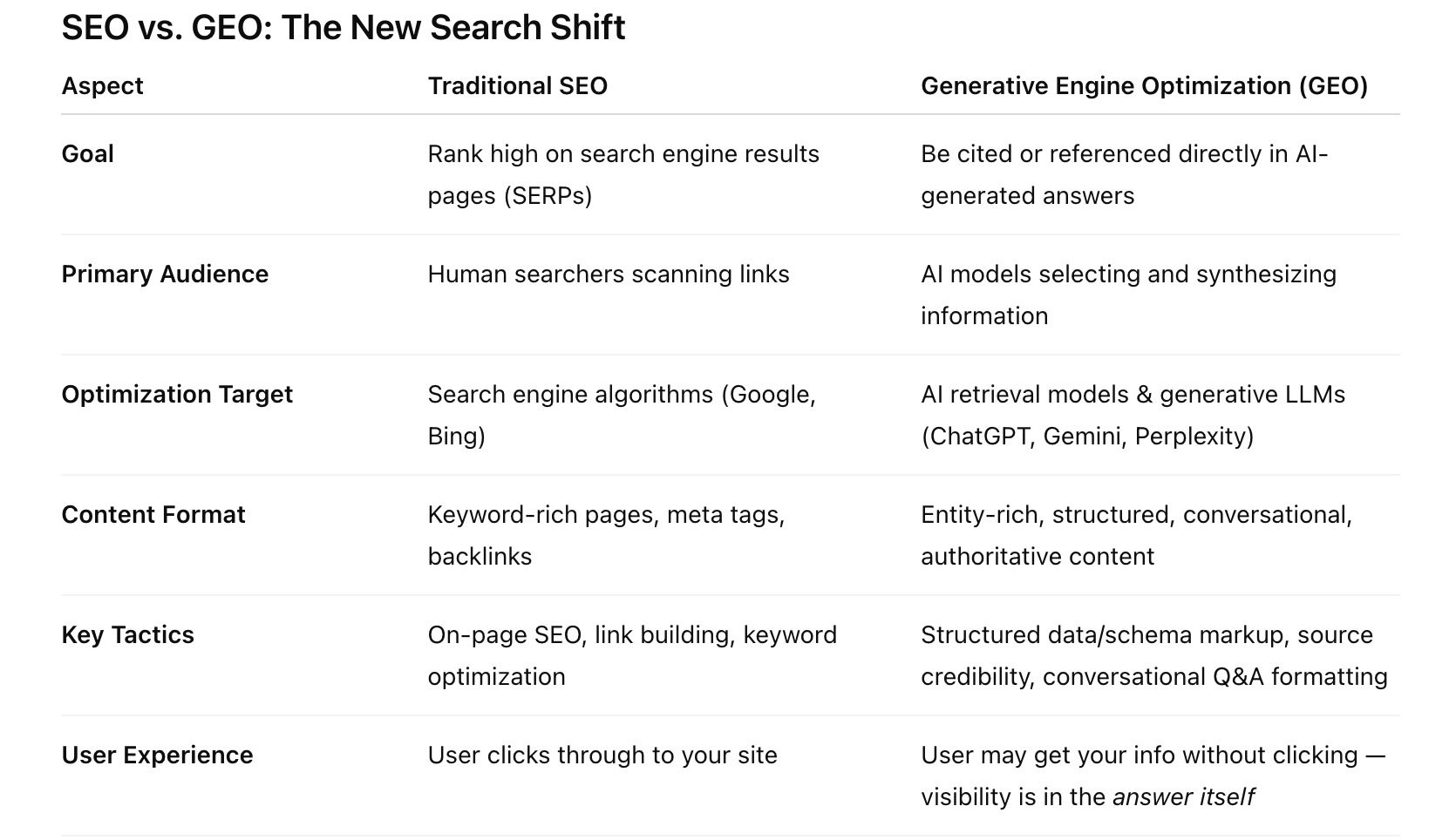How to Add Generative Engine Optimization (GEO) to Your Digital Marketing Strategy

What is Generative Engine Optimization (GEO)? GEO is a strategic approach to content creation and optimization to ensure it’s effectively utilized by generative AI models and large language models (LLMs) like ChatGPT, Google Gemini, and Perplexity.
GEO is surfacing as the new SEO. It’s no longer a ‘niche’ tactic, but a must. Search engines are shifting from being links listed ON Google to being included IN AI-powered LLMs.
Here’s why GEO is having its moment.
Search is no longer just Google links.
People are asking questions directly to AI assistants and getting summarized answers instead of lists of links. GEO focuses on optimizing your content so AI models select and synthesize it into their responses.
Source visibility in AI matters.
When a Large Language Model (LLM) cites or links to you in its answer, that’s the new Page 1 Google ranking. GEO aims to make your content structured, clear, and authoritative enough that the AI trusts it as a source.
Content strategies must shift to optimize GEO.
SEO optimizes for search engine crawlers and keywords. GEO optimizes for AI training and retrieval models using schema markup, entity-rich language, conversational formatting, and authoritative signals.
Users are skipping Google and going straight to AI to search.
Users are skipping Google entirely for certain queries, especially for research and decision-making questions. Being AI-visible now could be like buying beachfront property before everyone else.
GEO is still early. Meaning brands that learn how to feed AI the right signals now will own that visibility when AI assistants dominate search behavior.
Below are five steps you can take now to optimize your digital strategy for AI answers.
Structure Your Content for AI
The goal is to make your content machine-readable, trustworthy, and easy to summarize so LLMs naturally “pick it up” when generating answers.
- Lead with direct, clear answers.
- Use clear, concise Q&A formatting (FAQs, “what is,” “how to” sections).
- Add machine signals with schema markup (FAQ, HowTo, Product, Organization, etc.) and metadata
- Write for summarization in plain, declarative sentences in entity-rich language (mention people, places, organizations, dates). Use synonyms and variations.
Build Authority
Authority is the currency that LLMs use to decide which sources to trust and cite.
- Publish authoritative, well-cited content with references to trusted sources.
- Establish expertise and name the authors (bios, credentials).
- Encourage citations and backlinks from reputable sites which is a trust signal for AI.
- Stay consistently visible with a publishing on a regular content cadence.
Optimize for Conversational Discovery
The goal here is shaping your content so it’s the most natural match when people ask questions to AI assistants.
- Mirror natural language prompts your identified persona would type or ask (“What are the best running shoes for flat feet,” “How do I apply for a passport in Texas?”).
- ❌ Old SEO: “AI healthcare solutions”
✅ GEO: “How is AI being used in healthcare in 2025?”
- ❌ Old SEO: “AI healthcare solutions”
- Write in conversational style and add examples, scenarios, analogies that mimic how humans explain things. That way LLMs can summarize easily.
- Structure answers like a dialogue. Use bullet points, numbered lists, and tables. AI loves structured information.
Measure GEO Visibility
This can be a bit tricky. Unlike SEO, there’s no single “SERP ranking” yet. Instead, it’s about tracking how often your content is surfaced, cited, or summarized inside AI-generated answers.
- Track AI citations and answers. Check “sources” at the bottom of answers. Are you listed or cited?
- Use emerging AI analytics tools such as AIPerf.
- Manual spot-checks: run your prompts in different AI agents and see if your content appears.
- Monitor traffic, engagement (eg., time on page, going deeper into the site) and conversions.
The rise of GEO doesn’t replace SEO. It redefines it for an AI-first era. While traditional SEO focuses on climbing search rankings and driving clicks, GEO is about ensuring your expertise, authority, and credibility surface directly in AI-generated responses. Don’t get left out of the response. Change your content, SEO and overall marketing strategies NOW.

